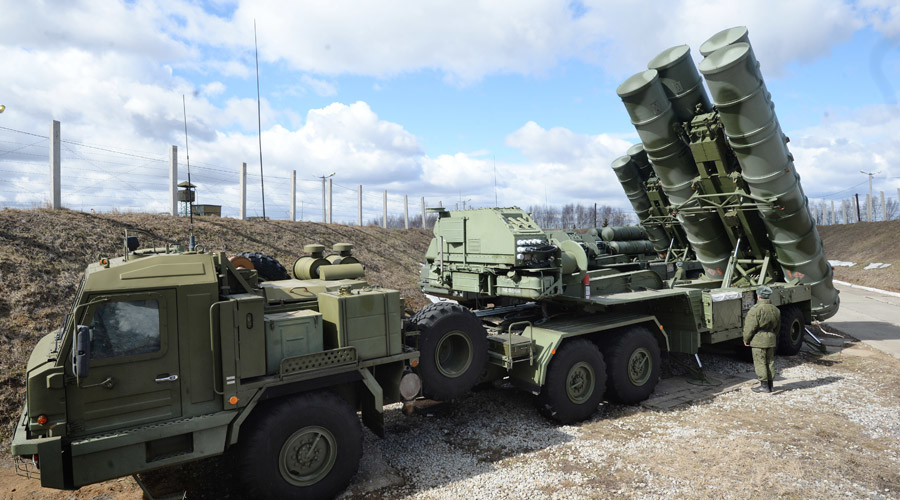Shadows over Turkey’s possible purchase of the Russian S-400
By Emanuele Scimia
Τurkish President Recep Tayyip Erdogan and his Russian counterpart Vladimir Putin discussed Ankara’s possible acquisition of Russia’s S-400 long-range air defense missile system during a meeting at the Russian Black Sea resort of Sochi on Wednesday. The Kremlin said the two sides had struck a “positive tone” on the ongoing negotiations, but the whole process continues to cast more shadows than light.
On April 28, Ankara’s Foreign Minister Mevlut Cavusoglu told a Turkish media outlet the government had an agreement in principle to buy from Russia an undefined number of S-400 systems. Cavusoglu underlined that relevant discussions were primarily focused on price, technology transfer and possible joint production.
By Emanuele Scimia
Τurkish President Recep Tayyip Erdogan and his Russian counterpart Vladimir Putin discussed Ankara’s possible acquisition of Russia’s S-400 long-range air defense missile system during a meeting at the Russian Black Sea resort of Sochi on Wednesday. The Kremlin said the two sides had struck a “positive tone” on the ongoing negotiations, but the whole process continues to cast more shadows than light.
On April 28, Ankara’s Foreign Minister Mevlut Cavusoglu told a Turkish media outlet the government had an agreement in principle to buy from Russia an undefined number of S-400 systems. Cavusoglu underlined that relevant discussions were primarily focused on price, technology transfer and possible joint production.
The S-400 is designed to hit aircraft, drones and cruise and ballistic missiles up to 400 kilometers away and is equipped with a radar able to detect targets at 600km. Turkey has turned to this Russian advanced defense complex after failing to finalize a deal to purchase air defense missile systems from other members of the North Atlantic Treaty Organization. Disagreements over price, technology transfer and co-production have so far derailed Western efforts to provide Ankara with a modern missile defense shield.
Turkey was set to buy China’s FD-2000 (HQ-9) air defense platform in 2015. However, it scrapped the US$3.4 billion contract because of Beijing’s unwillingness to transfer technology and pressures from Nato members concerned about Ankara’s purchase of an arms system that could not be integrated into the alliance’s defense apparatus.
Selling the system to a Nato country
Many doubt that Moscow will really sell one of its most advanced arms systems to a Nato country, even though Bulgaria, Greece and Slovakia – three other member states – already have in their arsenal some Russian S-300 surface-to-air defense units.
Vladimir Kozhin, Putin’s aide for cooperation in defense-related technologies, stressed in March that the Kremlin saw no problem in delivering the S-400 to Nato countries. In Kozhin’s words, Moscow tightly regulates both how a foreign client can use Russian weaponry and the protection of its intellectual property rights.
The reality, however, is that there is nothing Russia could do to prevent Turkey from sharing the S-400 system’s technology with Nato allies and assessing with them its performances during joint drills.
For its part, Turkey could struggle to harmonize the S-400 with Nato’s hardware and processes, as this integration would endanger the Alliance’s codes and procedures. Ankara is part of Nato’s European Phased Adaptive Approach initiative, which aims to provide the Old Continent with a missile defense system, and hosts a US ballistic-missile defense radar at the Kürecik base in the eastern province of Malatya.
In this regard, Turkish Defense Minister Fikri Isik recently said the system would not be integrated into the Nato defense system. It remains to bee seen how viable it will be for Ankara to deal with two different air defense shields.
Erdogan, Assad and Putin
But the key question is about how Turkey intends to use the S-400 batteries. To get a more accurate assessment of Ankara’s plans, however, it is needed to know how many platforms the Turkish government is interested to buy. The deployment of a couple of them will not certainly determine a dramatic change in the country’s defensive capabilities.
Then there is the issue of where the S-400 units would be positioned. Currently, Ankara’s only external enemy is the Syrian government of Bashar al-Assad. Hence the S-400 units should be reasonably stationed in Turkey’s southern regions to counter potential threats from the Syrian regime’s warplanes. For sure, Erdogan does not plan to buy the S-400 to deter the Islamic State extremist group in Syria or the US-backed Syrian Kurds.
The problem is that the Assad regime is supported by the Kremlin and its military forces. To remove this paradox, Turkey and Russia should find some kind of common accommodation on Syria. If that happens, Ankara will further distance itself from Nato allies – many of which are critical of Erdogan’s authoritarian tendencies and frequent geopolitical turnarounds – while Moscow will score a notable victory in its systematic effort to undermine the Atlantic alliance.
In contrast, if Erdogan and Putin fail to compromise on Syria, or the Russian-Turkish push for a political settlement in the war-torn Middle Eastern country is disrupted by other actors, it is doubtful that Moscow will manage to force Ankara not to use the S-400 system against Russian interests in the region.


Δεν υπάρχουν σχόλια:
Δημοσίευση σχολίου
Υφίσταται μετριασμός των σχολίων.
- Παρακαλούμε στα σχόλια σας να χρησιμοποιείτε ένα όνομα ή ψευδώνυμο ( Σχόλια από Unknown θα διαγράφονται ).
- Παρακαλούμε να μη χρησιμοποιείτε κεφαλαία γράμματα στη σύνταξη των σχολίων σας.